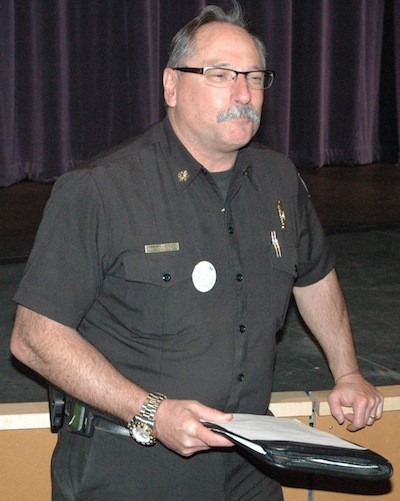ARLINGTON — When Mary Schoenfeldt, of the Green Cross Academy of Traumatology, spoke to area residents at the Byrnes Performing Arts Center on Tuesday, April 29, about Critical Incident Stress, she made the scope of its impact quite clear.
“There’s not any of us here who aren’t susceptible to it, based on what we’ve already gone through,” Schoenfeldt said, referring to the community’s many connections to the March 22 slide in Oso. “I live in Marysville and work in the Everett office of the Department of Emergency Management. That Saturday, I just happened to have the duty phone.”
While Schoenfeldt had played active roles in disaster recovery efforts across the country, this was the first time that such a disaster hit literally so close to home for her.
“I was very thankful that I was able to apply in my own community what I’d learned from dealing with such incidents in other communities,” Schoenfeldt said.
Rather than asking anyone in attendance to speak or volunteer their own feelings or experiences, Schoenfeldt simply listed some of the more common symptoms of Critical Incident Stress, and made clear that trained and certified professionals would be available to listen after the meeting if they were needed.
“Critical Incident Stress can follow in the wake of a sudden, high-profile tragedy, that affects children and families, and gains media attention,” Schoenfeldt said. “Our bodies and brains both struggle to make sense out of such senselessness. It doesn’t just hit us emotionally, but physiologically as well. Our bodies release all these chemicals in response, which can make our hearts beat faster, make us sick to our stomachs or even cause a loss of bladder control. Distraction and confusion are very common symptoms.”
Schoenfeldt urged people to talk with doctors if they’re experiencing insomnia or frequent nightmares.
“Again, nightmares are a way that the subconscious tries to make sense of the senseless,” Schoenfeldt said. “The brain tries to compare it to similar experiences, but if you don’t have any similar experiences, then it plays on your fears.”
The symptoms can range from cognitive lapses, such as difficulty in remembering people or even identifying shapes, to emotional problems, such as being easily startled, quick to anger or spontaneously bursting into tears.
“Sometimes, you just feel like you want to withdraw, to step back or step away, and sometimes that’s the best thing to do,” Schoenfeldt said. “If you can’t complete a task or get settled, just take 10 minutes to walk away and come back. Break what you have to do down into lists of tasks so that you feel a sense of accomplishment when you complete each one.”
Guilt can be an especially crippling emotional response to Critical Incident Stress, whether it’s directed at yourself or toward others.
“There’s the ‘coulda, shoulda, woulda’ of survivor’s guilt, but you have to tell yourself that there’s no guarantee it would have turned out better if those factors had been changed,” Schoenfeldt said. “Some people respond by blaming others instead, but it’s motivated by the same desire to take some measure of power back.”
Schoenfeldt has already heard from several Darrington residents who now have panic attacks triggered by getting into their cars.
“There’s also those folks who just avoid checking their emails or answering their phones,” Schoenfeldt said. “Many of the ways that we respond to Critical Incident Stress aren’t particularly healthy, but what can we do?”
Schoenfeldt suggested falling back on strategies that have helped you overcome stress in the past, and encouraged everyone to talk about their issues.
“There’s this image we have of ourselves, and we can wear it like armor,” Schoenfeldt said. “You need to be able to take down the mask.”
While diversions such as art projects can provide healthy breaks from such traumas, Schoenfeldt repeatedly emphasized that the most important thing, especially when one is suffering from the fatigue of feeling too much compassion for others, is to care properly for oneself.
“We hurt because other people are hurting, but it’s okay to take good care of yourself too,” Schoenfeldt said. “Pace yourself. Set realistic expectations for yourself. Don’t make any big life decisions, because your Critical Incident Stress means that you’re lacking your full powers of judgement. Listen to those around you, like family and friends, who know you and care about you, and be gentle with yourself.”








